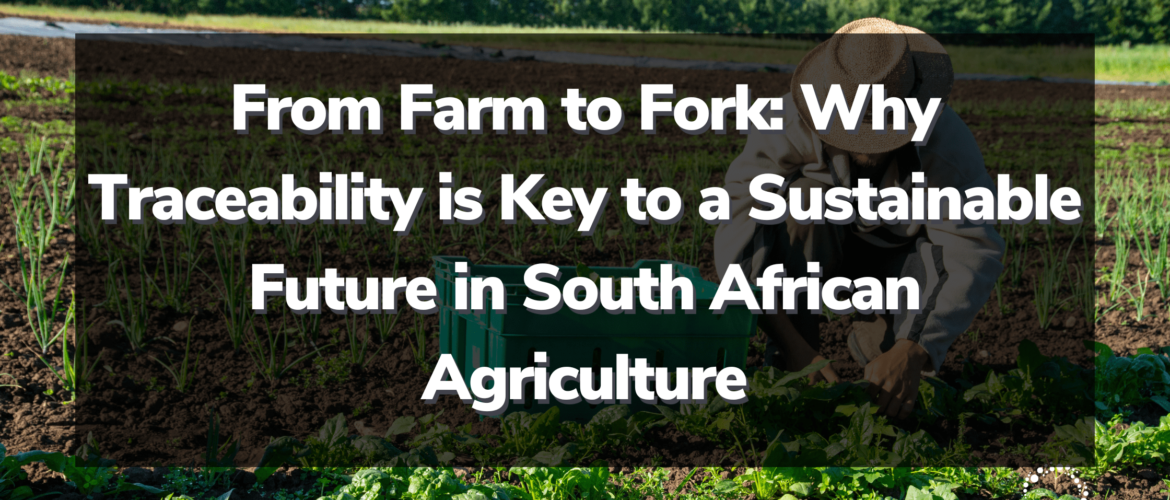
Why We Need Traceability in Agriculture
The South African agriculture sector is a vital contributor to the country’s economy. With increasing global demand for South African agricultural products, there is a growing need for the sector to ensure food safety and quality control through traceability systems. Modern consumers are increasingly seeking safe, sustainable, and ethically produced food, which is why traceability has become a crucial aspect of modern agriculture. In this blog post, we will explore the importance of traceability in agriculture for South African farmers and how they can benefit from implementing traceability systems on their farms.
What is traceability in agriculture?
Traceability in agriculture refers to the ability to track and trace a product from farm to fork. This involves recording and documenting every stage of production, processing, and distribution to ensure food safety, quality control, and compliance with regulations.
Why is traceability important in agriculture?
Traceability is important in agriculture because it helps to ensure food safety, quality control, and compliance with regulations. It can also improve market access, increase efficiency and productivity, and reduce waste and losses. For these reasons, implementing traceability systems can provide several benefits for South African farmers.
Traceability in agriculture can provide several benefits to South African farmers, including:
Improved food safety and quality control
Traceability systems help farmers to comply with regulatory requirements, such as food safety and quality standards. Many countries have regulations in place that require farmers to track and document the production and movement of their products. By implementing a traceability system, farmers can easily comply with these requirements and avoid penalties for non-compliance. By implementing traceability systems, farmers can track and trace their products from farm to fork, ensuring that they meet quality standards and comply with food safety regulations. This can help to prevent foodborne illnesses and improve consumer confidence in South African agricultural products.
Enhanced market access
Many international markets require traceability systems as a prerequisite for trade. By implementing traceability systems, South African farmers can access these markets and benefit from higher prices for their products. For example, formal structures like the Livestock Identification and Traceability System (LITS-SA) give the beef industry greater access to key global markets such as the European Union and the US.
Increased efficiency and productivity
By implementing a traceability system, farmers can track the movement of their products from the farm to the market, including information about the inputs used in production, the transportation and storage of their products, and the final destination of their products. One of the key benefits of a traceability system is that it can provide farmers with a detailed picture of their production processes, allowing them to identify areas where improvements can be made. For example, a farmer may discover that a particular input is not yielding the desired results, or that a particular transportation method is causing damage to their products. By identifying these inefficiencies, farmers can take steps to address them, leading to improved productivity and profitability.
Reduced waste and losses
By tracking and tracing their products, farmers can reduce waste and losses by identifying and addressing issues in the supply chain, such as poor storage conditions, transportation problems, and incorrect labelling.
Build trust with consumers
Consumers are becoming increasingly concerned about the safety and quality of their food, and many are looking for products that are produced in a sustainable and transparent way. By implementing a traceability system, farmers can provide consumers with the information they need to make informed decisions about the products they buy, which can lead to increased customer loyalty and higher prices for their products.
What technologies can be used to facilitate traceability in agriculture?
Technologies such as barcodes, RFID tags, and GPS tracking can be used to facilitate traceability in agriculture, allowing for the automated tracking and documentation of every stage of production and distribution.
How can South African farmers implement traceability systems on their farms?
To implement traceability systems on their farms, South African farmers can follow these steps:
- Identify the key stages of production and distribution: Farmers should identify the key stages of their production and distribution processes, from planting and harvesting to processing and distribution.
- Establish record-keeping systems: Farmers should establish record-keeping systems to track and document every stage of production and distribution, including inputs, processes, and outputs.
- Use technology to facilitate traceability: Farmers can use technology, such as barcodes, RFID tags, and GPS tracking, to facilitate traceability and automate record-keeping processes.
- Train staff and suppliers: Farmers should train their staff and suppliers on the importance of traceability and how to use traceability systems effectively.
- Monitor and evaluate the traceability system: Farmers should regularly monitor and evaluate their traceability system to ensure that it is working effectively and identify areas for improvement.
With the increasing demand for safe, sustainable, and ethically produced food, traceability is no longer an option but a necessity for South African farmers. Traceability in agriculture is essential for South African farmers to ensure food safety, quality control, and compliance with regulations. By implementing traceability systems on their farms, farmers can access new markets, improve productivity and profitability, and reduce waste and losses. Traceability is also a critical tool in sustainable and regenerative farming. By providing farmers with detailed information about their production processes, traceability can help to promote more sustainable and responsible farming practices and support fair trade and social responsibility.

About the Author: Justin Platt
Justin is the Founder & CEO of Zylem and RegenZ. Justin has a BSc in Plant Pathology and Botany from UKZN. He has been involved in the agricultural services industry since graduating in 1979. Justin has a passion for regenerative agriculture.